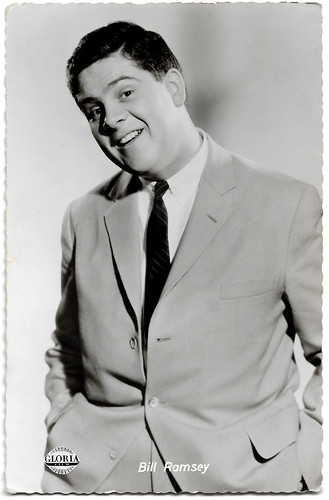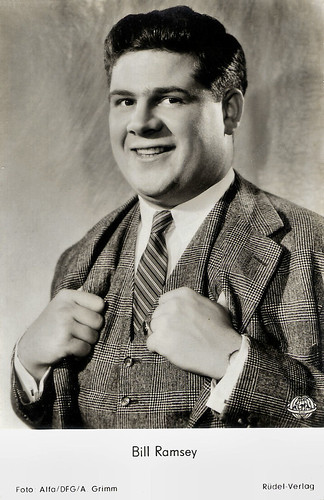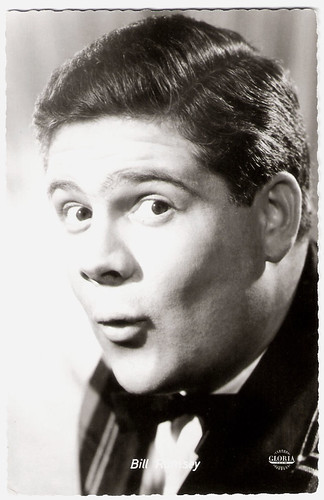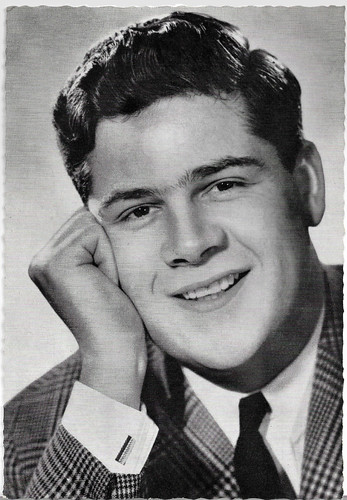
German postcard by Krüger, no. 902/83. Photo: Polydor / Filipp.

German postcard by Krüger, no. 902/219. Photo: Bernard of Hollywood (credited on the postcard). Possibly made for Heimweh nach St. Pauli (Werner Jacobs, 1963) in which he and Jayne Mansfield both played supporting parts. However, IMDb credits Lothar Winkler as the stills photographer of this Schlager film in which Mansfield sings the classic Snicksnack Snucklechen.

Dutch postcard by Uitgeverij Takken, Utrecht, no. AX 5011.

Dutch postcard by Gebr. Spanjersberg, Dutch licence holder for Ufa/Film-Foto. Photo: Erwin Schneider/ Ufa.
The Man With the Black Voice
William McCreery Ramsey, called Bill, was born in Cincinnati, Ohio in 1931. He was the son of a teacher and an advertising manager for Procter & Gamble.
In his youth, Bill sang in a college dance band. He began to study sociology and business from 1949 to 1951 at Yale University in New Haven and sang jazz, Swing, and Blues in the evenings. His greatest influences were Count Basie, Nat King Cole, Duke Ellington, and Louis Jordan.
Due to the Korean War, compulsory military service was again introduced in the US and Ramsey served with the US Air Force in Germany.
During this period, he appeared in clubs like Jazzkeller (Jazz Cellar) in Frankfurt/Main and was discovered by an employee of the American Forces Network (AFN) and hired to entertain troops. There Ramsey advanced to executive producer and had, although still in service, more time for appearances at festivals.
As of 1953, he appeared with, among others, Ernst Mosch, Paul Kuhn, and James Last. In 1955, the jazz pianist and music producer Heinz Gietz organised an appearance with the public broadcaster Hessischer Rundfunk for Ramsey.
Then he appeared for the musical film Liebe, Tanz und 1000 Schlager/Love, dance and 1000 hits (Paul Martin, 1955) with Peter Alexander and Caterina Valente.
Upon his discharge from the military, he continued his studies in America. In 1957 Ramsey returned to Germany and continued his studies in Frankfurt.
Producer Heinz Gietz took Ramsey under contract in 1958 and in the same year his first single Yes, Fanny, ich tu das with Polydor was released. It was a small but respectable success and launched the style, with which ‘the man with the black voice’ would land hits in the future.
His music was oriented on Anglo-American pop hits of the late 1950s. In 1959 he had a #1 hit with Souvenirs. Among Ramsey’s hits were German-language covers of Hank Ballard, The Beatles, Fats Domino, Elvis Presley, and Andy Williams.
In addition, he also performed originals, composed almost exclusively by Heinz Gietz. The ironic texts of Kurt Feltz or Hans Bradtke often commented on current events.

German postcard by Kolibri-Verlag, Minden/Westf., no. 1492. Photo: Alfa / Gloria / Grimm. Bill Ramsey in Adieu, Lebewohl, Goodbye (Paul Martin, 1961).

German postcard by Kolibri-Verlag, Minden/Westf., no. 1609. Photo: Europa. Bill Ramsey in Heute gehn wir bummeln/Today we're going for a stroll (Erik Ode, 1961).

German postcard by Rüdel-Verlag, Hamburg-Bergedorf, no. 2691. Photo: Polydor.

German postcard by Rüdel-Verlag, Hamburg-Bergedorf no. 3558. Photo: Alfa / DFG / Arthur Grimm. Bill Ramsey in Café Oriental (Rudolf Schündler, 1962).
The Comic Sidekick
Bill Ramsey and Gietz signed to the Columbia label of the EMI Group in 1962, where they would continue their success.
His popularity provided numerous appearances in film and television, where he was seen as a singer and in comedy roles.
He starred as the comic sidekick in films like Die Abenteuer des Grafen Bobby/Count Bobby's adventures (Géza von Cziffra, 1961) with Peter Alexander, the crime film Zwischen Schanghai und St. Pauli/Between Shanghai and St. Pauli (Wolfgang Schleif, 1962) with Joachim Hansen, and the Euro-Western Old Shatterhand (Hugo Fregonese, 1964) starring Lex Barker in the title role and Pierre Brice as Winnetou.
Till the middle of the 1960s, Bill Ramsey was a regular in the German charts, but beat music changed the market. In the second half of the 1960s, Ramsey took up predominantly English-language songs and dedicated himself again to jazz and blues. In this musically varied decade, he presented operetta, musical, and beat songs as well as an LP with Children’s songs.
Ramsey changed to Heinz Gietz’s record company Cornet in 1966, and later in the same year to Polydor. Ramsey appeared on different labels in the 1970s.
On TV, he moderated such shows as Hits for Schlappohren (1971) and Talent Shed (1974-1980).
In the cinema, he was seen in the box-office hit Die Schweizermacher/The Swissmakers (Rolf Lyssy, 1978) with Emil Steinberger. The comedy deals with the many woes of foreigners who decide to obtain Swiss nationality but are forced to deal with bureaucratic and cultural barriers. Die Schweizermacher is one of the most successful Swiss films ever.
Ramsey was a lecturer for many years at Hamburg University for Music and Performing Arts. He kept appearing regularly as a pop and jazz singer, mostly in duet with the guitarist Juraj Galan, with whom he released several albums. The duo's LP 'Live in the House of Commons' won the German record critics prize.
Bill Ramsey was also the host of Radio HR2’s Swingtime. In 2008 and 2009 he was on tour with Max Greger and Hugo Strasser as Swing legends. Since 1984, Bill Ramsey was a German citizen. He lived occasionally in Zurich, later in Wiesbaden, and since 1991 with his fourth wife Petra in Hamburg. His widow is a doctor and worked as his manager.

German postcard by Kolibri-Verlag G.m.b.H., Minden-Westf., no. 1256. Photo: Erwin Schneider.

Dutch postcard by Gebr. Spanjersberg, Rotterdam, no. 667.

German postcard by Kolibri-Verlag G.m.b.H., Minden-Westf., no. 1524. Photo: Arthur Grimm / Alfa / Gloria. Publicity still for Adieu, Lebewohl, Goodbye (Paul Martin, 1961).

German postcard by Filmbilder-Vertrieb Ernst Freihoff, Essen, no. 735. Photo: Polydor.

German postcard by Filmbilder-Vertrieb Ernst Freihoff, Essen, no. 766. Photo: Bellé.
Source: Wikipedia (English and German) and IMDb.
No comments:
Post a Comment